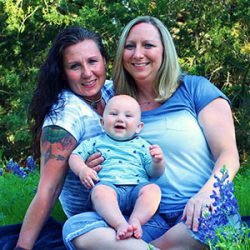Reciprocal IVF gives lesbian couples the opportunity to physically share in the pregnancy
One of the options available for lesbian couples who want to have children is reciprocal IVF. This treatment allows each woman to take part in the pregnancy. Our Dallas fertility center physicians and staff will explain every step of the procedure, from your initial consultation to your IVF procedure.
Contact
Devoted to you, dedicated to your success
Contact Dallas IVF today to set up an appointment to discuss your fertility options. Now offering telemedicine virtual consults.
Call us: (214) 225-2057
How are both partners involved in the pregnancy?
Reciprocal IVF is much like our standard IVF procedure, but in this case, one female partner’s eggs are retrieved and combined with donor sperm in our state-of-the-art IVF lab to create embryos. The other female partner serves as the gestational carrier, so the embryo is transferred to her uterus.
What are the steps involved in reciprocal IVF?
- During reciprocal IVF, one partner serves as the egg donor. The FDA regulates all egg donations, whether the eggs are provided by donors known to you or by anonymous donors. Egg donors are required to receive genetic and medical screening. Once the egg donor is approved, our Dallas fertility center physicians can proceed with egg retrieval.
- The partner who is providing the eggs will need to take hormonal fertility medications to stimulate the ovaries so there is a good supply of eggs available for the retrieval procedure.
- After the egg retrieval phase of reciprocal IVF, the eggs are combined with donor sperm in the IVF lab and one of the resulting embryos is transferred within three to five days if you choose to have a fresh embryo transfer cycle, or the embryos can be frozen for later transfer. For a fresh cycle, both partners will need to take fertility medications so that their menstrual cycles can be synchronized.
What decisions do couples need to make?
When a couple decides to undergo reciprocal IVF, our Dallas fertility center physicians and staff will guide them through the decisions that need to be made.
- Whose eggs will we use?
If both women are age 35 or younger and have no fertility issues, this is a decision couples can make based on non-physical factors; however certain factors may make one partner a less suitable egg donor than another.
- Being age 35 or older
- A social history that includes smoking, drinking or recreational drug use
- Medical conditions such as having sexually transmitted infections
- Irregular menstruation or menstrual problems
- Being either too thin, overweight or obese
- A poor response to hormonal fertility medications
- Who will provide our donor sperm?
Couples will need to decide if they will use donor sperm from a known or anonymous donor.
At our Dallas fertility center, we are committed to helping members of the LGBT community have families. If you are interested in reciprocal IVF, contact us.
